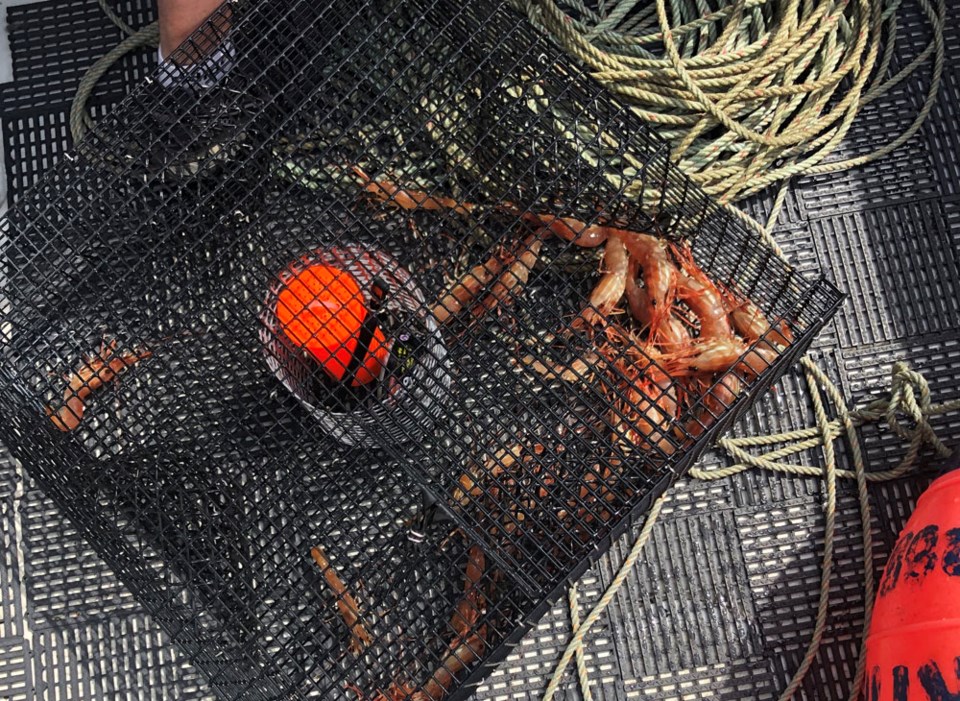This story has been amended since first posting to clarify that it was prawn fishing licence that was suspended.
A commercial fisher who set 33 prawn traps inside a protected glass sponge reef area in Howe Sound has been fined $25,000 and had his prawn fishing licence suspended for a year.
Judge Joanne Challenger of North Vancouver provincial court handed the fine to Stewart Lawrence McDonald, 53, on Wednesday (Nov. 22) for two fisheries convictions.
Challenger found McDonald guilty of fishing in a closed time and illegally setting prawn traps in May 2016 following a trial in 2019.
In handing down her sentence, Challenger said deliberately bottom fishing in an area closed specifically to protect the delicate glass sponge reefs from lasting harm called for a strong response from the courts.
Howe Sound’s glass sponge reefs are “an ancient, globally unique and extremely delicate ecosystem,” believed to be extinct until the late 1980s when they were discovered in Hecate Strait, Queen Charlotte Sound and later in Howe Sound and Chatham Sound, said Challenger. The glass sponge reefs are also “very fragile” said the judge, and if they are damaged by activities such as bottom fishing, “recovery can take up to hundreds of years.”
In McDonald’s case, however, “He deliberately set his traps in the closed glass sponge area,” said the judge.
During the trial, two fisheries officers testified that they received information on May 30, 2016 about possible fishing in a closed glass sponge area near Anvil Island in Howe Sound. Information had come in through the fisheries department’s vessel monitoring system, which tracks the movements of commercial fishing boats through transponders. The data showed a commercial prawn-fishing vessel, the Lormax, registered to McDonald, had been inside the closed area of the sound for about 45 minutes on May 29 and that the boat had followed a V-shaped pattern in and out of the area.
Fisheries officers set off in a zodiac May 30 and arrived at the area that afternoon. There, they found two buoys just outside the closed area consistent with where the vessel monitoring system indicated the boat had entered and left the closed area, according to Challenger’s written decision in the case. The buoys were prawn buoys, marked with the vessel number for the Lormax.
The fisheries officers pulled up each of the 33 the baited traps, marking their locations with a GPS system. “Their path of travel took them well inside the closed area and back out again to the buoy at the end of the trap line,” the judge noted.
Challenger said while the case was circumstantial, the evidence was consistent with guilt and “there are no other plausible theories or reasonable possibilities.”
She rejected McDonald’s suggestion that the wind or tide could have moved the traps or resulted in errors about exactly where the traps were located.
The only reasonable explanation is McDonald acted as he did “in order to create the impression the prawn string was outside the closed area to avoid being detected and to have the advantage of fishing in an area where no one else was fishing,” said the judge.
There was also no evidence that McDonald took all reasonable care to make sure he wasn’t fishing in a closed area, she wrote.
Challenger said there was no evidence that the glass sponge reefs were harmed by McDonald’s prawn traps, although she also noted it is often difficult to determine harm in environmental cases.
McDonald had 19 warnings and convictions for fishing offences between 1998 and 2016, including several prior convictions for setting gear during a closed time, Challenger noted. In one instance, he was convicted for a “nearly identical” circumstance of fishing in a closed area of Howe Sound near Porteau Cove in March 2009, she said, which involved “the same devious practice of setting his buoys outside a closed area, but setting his prawn traps inside that closed area.”
“He holds the view it is unnecessary for him to strictly comply with the Fisheries Act and regulations, and that this has been a long standing attitude,” said the judge. “He is more concerned with profit.”
“He is sorry he was caught, but shows no concern for any damage he did to the reef.”
Challenger said a significant penalty was needed to send a message to McDonald that “his prawn licence is a privilege and not a right” and also that anyone in the fishing community who doesn’t comply with regulations “will pay a heavy financial price” that is “more than the cost of doing business.”
“The court must send a strong message that such conduct will not be tolerated and those who endanger a glass sponge reef will face serious consequences.”



